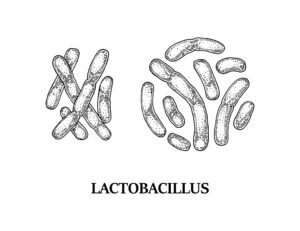Improve Your Gum Health with Probiotics

Our mouths are home to trillions of bacteria, some of which are good for us and some that aren’t. The good ones help with certain bodily functions and control the amount of bad bacteria, while the bad ones can cause tooth decay and gum disease. Good bacteria are also known as probiotics and they may help benefit your gum health. This blog post will explain more about probiotics and how they can improve gum health to treat gum disease.
Probiotics are beneficial bacteria most commonly known for their ability to balance bacterial levels in the gut to reduce digestive issues. They are primarily composed of bacteria, but can also be made up of yeasts in some cases. Probiotics help to promote good bacteria while fighting disease-causing bacteria. While they are primarily associated with balancing good and bad bacteria in the gut to reduce digestive issues, probiotics have also been found to benefit the skin, urinary system, lungs, and mouth.
Recent research has now begun to suggest that certain types of probiotics may even be beneficial to the teeth and gums. There are different types of probiotics, and certain types have been found to be more effective in treating or managing certain conditions. When it comes to the teeth, gums, and mouth, Lactobacilli has been identified as a key probiotic. There are several strains of Lactobacilli, such as:

- Lactobacillus acidophilus
- Lactobacillus brevis
- Lactobacillus casei
- Lactobacillus fermentum
- Lactobacillus gasseri
- Lactobacillus plantarum
- Lactobacilus reuteri
- Lactobacillus rhamnosus
- Lactobacillus salivarious
Recent research conducted on Lactobacilli has evaluated four different types of probiotics that may be beneficial and effective in the treatment of gum disease. These include: L. gasseri, L. fermentum, L. reuteri, and L. brevis. Researchers found that the amount of L. gasseri and L. fermentum correlated with the amount of harmful bacteria and gum health. Specifically, it was found that higher amounts of L. gasseri and L. fermentum were associated with healthy gums and lower amounts of the bacteria responsible for gum disease.
Additionally, L. reuteri and L. brevis were also found to be effective against gum disease. L. brevis and L. reuteri were both administered to individuals with gum disease for a period of time. Chewing gum containing L. reuteri was used, as were lozenges containing L. brevis. At the end of the designated time period, it was noted that the amount of plaque had decreased and that there was an overall improvement in inflammation.
Specific probiotics may be able to treat gum disease, according to these findings. However, researchers point out that further study is needed to identify specific probiotics that work effectively against gum disease, examine the mechanisms by which these bacteria work, and track the long-term effects of probiotic therapy.
Of course, this still does not negate the fact that the the best approach to treat or prevent gum disease is still to maintain strict oral hygiene. Brushing, flossing, and dental cleanings are all highly effective methods for reducing the amount of germs in your mouth and avoiding gum disease. Probiotics may improve gum health, but they should never be used instead of good oral care. With that said, the regular use of probiotics as a supplement to excellent oral hygiene might assist you in managing your gum disease.
Treating gum disease is an important part of maintaining good oral health. Recent research has suggested that probiotics may be able to decrease the bacteria associated with gum disease and improve gum health. Probiotics may improve your gum health, but they should never be used in place of regular tooth brushing and flossing. With that said, the use of probiotics in conjunction with excellent dental hygiene might assist you in managing your gum disease.






Recent Comments